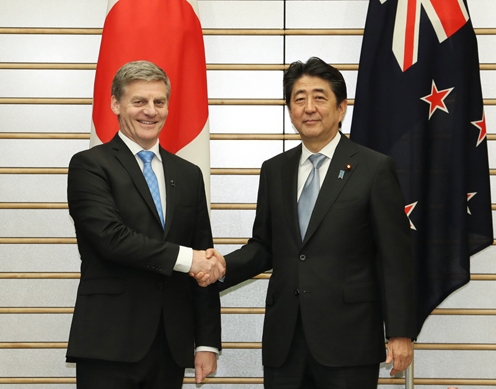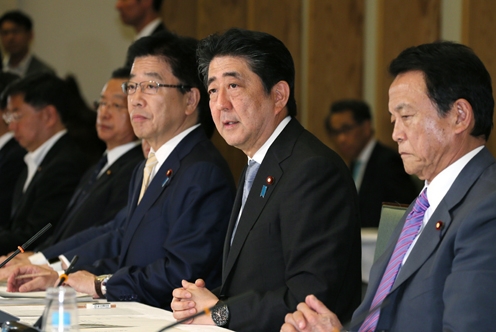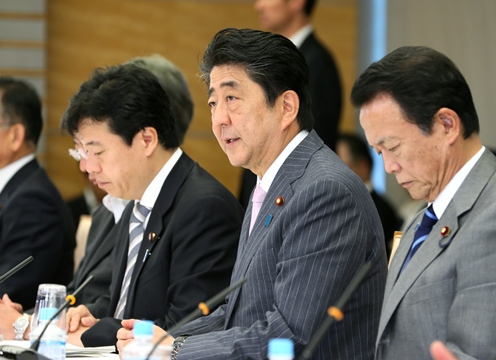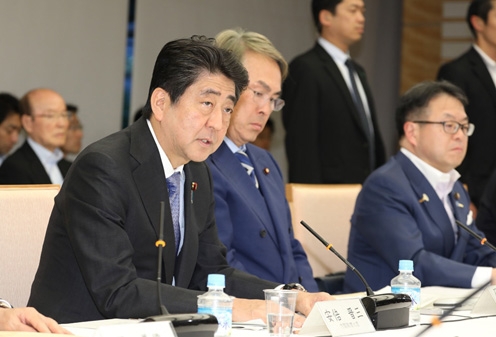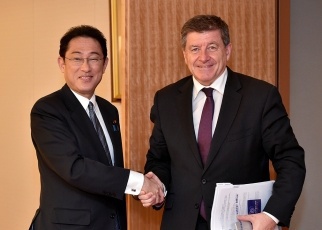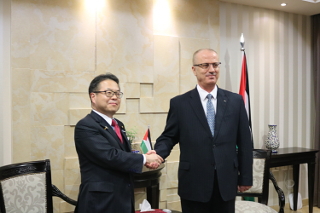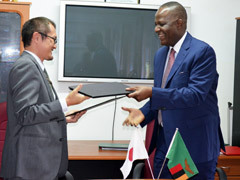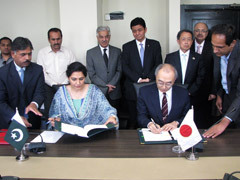Japan-New Zealand Summit Meeting and Other Events
Cabinet Secretariat, Wednesday, May 17, 2017
[Provisional Translation]
Prime Minister Shinzo Abe hosted a summit meeting and other events with the Rt. Hon. Bill English, Prime Minister of New Zealand, at the Prime Minister's Office.
The two leaders attended a salute and guard of honor ceremony, followed by a summit meeting. Thereafter, the leaders held an exchange of documents and a joint press announcement.
Finally, the Prime Minister hosted a banquet at the Prime Minister's Official Residence, and said in his address,
"I would like to extend my heartfelt welcome to Prime Minister English and Mrs. English on their visit to Japan. When we think of New Zealand, we of course think of rugby. Needless to say, the All Blacks, New Zealand's national rugby team, are the strongest team in the world and have won the last two Rugby World Cups in succession. Last week I went to Kyoto to take part in the pool draw for the Rugby World Cup 2019, which will take place in Tokyo. I made a draw myself and had only one wish: please let us not be cast in the same group as New Zealand.
I do not know whether my wish was granted but, as it turned out, Japan and New Zealand are in different groups. There are still two years until the World Cup. I hope that the Japan team will practice even harder and, if possible, meet New Zealand in the final match. Earlier, I was delighted to hear from Prime Minister English that next year the All Blacks will be sent to Japan. I hope that next year will prove to be a preliminary skirmish between our two teams before the World Cup final.
I would like to present this commemorative ball to Prime Minister English, a rugby player himself, with the hope that we will be able to watch the final match together.
The exchanges between the peoples of Japan and New Zealand are also very lively. Every year, 100,000 Japanese people visit New Zealand. Many Japanese people visit the so-called sacred spots of films, that is, locations where films such as the Lord of the Rings trilogy and The Last Samurai were shot, and there are also 10,000 Japanese exchange students in New Zealand. More than 20,000 people in New Zealand are studying the Japanese language. Further, every year 250 young people from New Zealand come to Japan through the JET Programme, and are active in English education and cultural exchange. I am very pleased that such vigorous exchanges between our peoples have become the foundation of our strong bilateral ties.
We have invited to today's banquet leaders who are supporting the invaluable friendly relations between our two countries in a range of areas, including politics, the economy, academia, and sports. Thanks to all of you, we have our current bilateral relationship. I would like to take this opportunity to express my gratitude to all of you and ask for your continued support for the further deepening of the relationship.
I would now like to raise a toast to the continued health and success of Prime Minister English and Mrs. English, and all those in attendance today, and to the further development of the partnership between Japan and New Zealand."
Follow-Up Meeting on the Plan to Realize the Dynamic Engagement of All Citizens
Cabinet Secretariat, Wednesday, May 17, 2017
[Provisional Translation]
Prime Minister Shinzo Abe held the first follow-up meeting on the Plan to Realize the Dynamic Engagement of All Citizens, at the Prime Minister's Office.
At the meeting, there was discussion on the state of progress of the Plan to Realize the Dynamic Engagement of All Citizens.
Based on the discussion, the Prime Minister said,
"We will create a society in which everyone can find fulfilment and fully exercise their capabilities. We will dismantle one by one the various barriers we face, such as the rigidly uniform labor system and obstacles to balancing childcare and nursing care with work. We will create a positive cycle of growth and distribution, and realize a society in which the wealth thus produced is spread widely among citizens so that many people enjoy that growth. The dynamic engagement of all citizens tackles this challenge.
Japan's relative poverty rate was released last October and, for the first time since statistics were first calculated, has shown a decrease. In particular, the relative poverty rate of children was 9.2 15 years ago, 10 years ago it was 9.7, and five years ago it was 9.9, showing a consistent increase. However, the relative poverty rate of children has improved for the first time, and moreover this was a large improvement with a decrease of two points to 7.9. This is due to the income increase for families with children amidst the upturn in the economy, including the increase in employment, brought on by Abenomics. In order to further advance these conditions, we will continue to tackle challenges through the dynamic engagement of all citizens.
Before my administration's return to power over 100,000 jobs were lost, but since the start of the administration we have created 1.85 million jobs. This is a major negative-to-positive shift. In particular, before the start of my administration, 550,000 regular employment jobs were lost. While it is true that it took some time for us to increase regular employment, two years ago a shift to positive job growth was achieved. During these two years, approximately 800,000 regular employment jobs have been newly created. I would like to leverage this employment situation to seize the great opportunity to advance work style reform.
We are currently advancing work style reform as an extension of realizing the dynamic engagement of all citizens. At the end of March, the Action Plan for the Realization of Work Style Reform was approved.
The Action Plan incorporates legal revisions to realize equal pay for equal work, which was once considered to be difficult to immediately introduce, as well as the introduction of regulation of the maximum hours of overtime work, evaluated as a historic and major reform in the 70-year history of the Labor Standards Law. As a major challenge of realizing the dynamic engagement of all citizens, we will implement these measures with a sense of urgency.
We received the strong guidance from the expert members here today that follow-up is vital as we approve the Plan to Realize the Dynamic Engagement of All Citizens. I would like you all to continue to strictly view the progress and frankly say when you think progress has not been made. That is how follow-up works in a meaningful manner.
Today, one year since the approval, we had a discussion in regard to the implemented Plan to Realize the Dynamic Engagement of All Citizens based on the Government's status report.
Based on the views of the expert members received today, I would like the relevant ministers to implement measures with a greater sense of urgency toward the measures' realization. For example, earlier we heard the important opinion that there are still some issues in regard to hosting the Paralympic Games.
With the coming opportunity of the Olympic and Paralympic Games, we must work hard toward the goal of having Japan become a nation that is seen by the world as a wonderful country, a fulfilling country for people with disabilities and those who face various difficulties, and a country full of dreams that is easy to live in.
To that end, I believe that it is important to thoroughly conduct these follow-up meetings each year. I would like to continue to have follow-up meetings, and have each minister respond with a sense of urgency to the views we receive. Thank you for your continued cooperation."
Intellectual Property Strategy Headquarters
Cabinet Secretariat, Tuesday, May 16, 2017
[Provisional Translation]
Prime Minister Shinzo Abe held a meeting of the Intellectual Property Strategy Headquarters at the Prime Minister's Office.
During the meeting, the Intellectual Property Promotion Plan 2017 was approved.
Following the approval, the Prime Minister said,
"We have just approved the Intellectual Property Promotion Plan 2017.
In order to be the first in the world to offer solutions to various challenges we face by utilizing big data and artificial intelligence, we will establish the systems that will form the foundation of Society 5.0, including the formulation of guidelines for data use agreements and developing measures to prevent the inappropriate use of data.
As a way to catalyze regional vitalization, we will protect and cultivate the globally-viable technologies of regional small- and medium-sized enterprises as intellectual property, and transform the agriculture, forestry and fishery industries into industries on the offensive by protecting agricultural products with high added value through product registration and geographical indications, and increasing their brand value.
We will also strive to establish education consortiums on intellectual property creation that support educational institutions through industry-academia-government cooperation in every prefecture by FY2020, so as to foster creativity and an intellectual property mindset from elementary school.
In order to communicate the appeal of Japan and attract tourists from all over the world, we will promote initiatives such as creating new sightseeing spots by facilitating visits by animation fans to places that have been featured in works of animation, and fundamentally strengthen measures to promote the film industry, such as by providing assistance for on-location filming. We will create a work schedule towards building digital archives that collate Japan's intellectual and cultural assets.
Intellectual property is a valuable resource of Japan that anyone can create and use. The Government will work as one to promote our intellectual property strategy, so as to increase Japan's international competitiveness through innovation and attractive content. Thank you."
Council on Investments for the Future
Cabinet Secretariat, Friday, May 12, 2017
[Provisional Translation]
Prime Minister Shinzo Abe held the eighth meeting of the Council on Investments for the Future at the Prime Minister's Office.
At the meeting, debate took place on the agenda aimed at promoting the fourth industrial revolution and the opening of public assets and services to the private sector.
Based on the discussion, the Prime Minister said,
"Artificial intelligence, the Internet of Things, and big data will continue to connect people and products like never before. This will give rise to new value, and enable us to solve previously unsolvable problems. We will become the first country in the world to realize Society 5.0.
The strengths of Japan are our "monozukuri" or manufacturing, our rich amount of data, and our need to solve problems brought about by our aging population and falling birthrate.
We will continue to focus the investment of government resources into fields that utilize such strengths.
Successful innovation all depends on speed. When systems do not consider the possibility of new technology, there are no opportunities for trial and error, and little data can be created to prove safety and so on. Yet without such data, systems cannot be changed. It is a chicken and egg problem. If this continues to be the case, we will be left behind by the rest of the world.
We will therefore make trial and error possible, limited to certain participants and time periods. In other words, we will try out new ideas. We have received a proposal for the creation of a Japanese version of a regulatory sandbox. We will create a new framework that will allow us to incorporate the achievements of innovation into society as soon as possible.
When technology changes, the skills that workers are expected to have change as well. Even if the number of conventional jobs decreases due to the introduction of artificial intelligence and robots, companies that make full use of these technologies will create new, high-quality jobs.
We will enhance support for providing further learning opportunities so that people can update their abilities in order to continue to use IT over the course of their lifetimes. We will ensure that university curricula can meet the needs of the new era, such as by offering data science education programs for all students, regardless of whether they come from humanities or science backgrounds, or by expanding engineering programs across different faculties.
Regarding the opening of public assets to the private sector, we will continue to advance a cross-governmental system in order to roll out successful case studies in airports and roads to other promising fields such as sports facilities, cultural facilities, and cruise facilities, and to promote the opening of public assets in a full-fledged manner.
The Council on Investments for the Future has been debating a variety of issues toward the construction of Society 5.0 since September of last year. I would like the relevant ministers, led by Minister Ishihara, to accelerate discussion toward the formulation of the new Growth Strategy."
Foreign Minister Fumio Kishida Receives a Courtesy Call from the Director-General of the International Labour Organization
Foreign Affairs, Thursday, May 11, 2017
On May 11, commencing at 3:20 p.m. for approximately 15 minutes, Mr. Fumio Kishida, Minister for Foreign Affairs, received a courtesy call from Mr. Guy Ryder, Director-General, International Labour Organization (ILO). The overview is as follows.
1. At the beginning, Minister Kishida congratulated Director-General Ryder on his re-election, and appreciated the seven Centenary Initiatives, including the end to poverty initiative and the women at work initiative, which the ILO came out with under Director-General Ryder’s leadership to commemorate the 100th anniversary of the founding of the ILO in 2019. Additionally, Minister Kishida explained that Japan attaches importance to the implementation of the Sustainable Development Goals (SDGs), and that it intends to coordinate closely with the ILO.
2. In response, Director-General Ryder stated that the ILO ensures that all its initiatives are aligned with the SDGs, and that he is greatly encouraged by the fact that Japan’s priority initiatives domestically and internationally are aligned with the initiatives of the ILO. Furthermore, from that perspective, Director-General Ryder believed that it is possible to advance cooperation between Japan and the ILO in an extremely positive manner. Director-General Ryder also expressed deep gratitude for Japan’s contributions to the ILO on the personnel and financial fronts.
METI Minister Seko Visits Palestine, the State of Israel and Ukraine
METI, Monday, May 08, 2017
1. Palestine
1) Courtesy call to Prime Minister Hamdallah
Minister Seko and Prime Minister Hamdallah talked about Jericho Agro-Industrial Park, which is a flagship project representing the initiative of the Corridor for Peace and Prosperity and celebrates its 10th anniversary this year. Both sides shared their expectations for the contribution of the industrial park to employment creation and industry revitalization. In addition, Prime Minister Hamdallah showed his gratitude for Japan’s current cooperation as well as his expectation for Japan’s further cooperation in the future. Minister Seko stated that Japan will continue to engage in efforts so as to further encourage economic exchange.
2) Visiting Jericho Agro-Industrial Park
Minister Seko visited Jericho Agro-Industrial Park (JAIP), toured two plants (bar-soap and supplements plants) operated by Palestine companies, and exchanged views with business owners.
2. State of Israel
1) Japan-Israel Ministerial-level Economic Policy Dialogue
Bringing together Minister Seko and H.E. Mr. Eli Cohen, Minister of Industry and Economy, the first Japan-Israel Ministerial-level Economic Policy Dialogue was held. Both ministers welcomed the dramatic advancement of the Japan-Israel economic relationship since the leaders of both countries visited each other’s countries in 2014 and 2015, and also concluded a joint statement for the Japan-Israel Innovation Partnership, an initiative showing approaches to the Japan-Israel economic relationship in the new era. Major details of the partnership are as follows.
Facilitating cybersecurity cooperation in industrial fields
Both sides decided to promote human resource development through the utilization of the newly-established Industrial Cyber Security Center as well as collaboration in the field of business. Concerning these initiatives, both ministers concluded a memorandum of cooperation.
Promoting industrial R&D cooperation to expand investment in the field of high technology
Both sides decided to engage in further promotion of inter-company collaboration in the co-funding program by New Energy Industrial Technology Development Organization (NEDO) of Japan and the Israel Innovation Authority (IIA), and they will discuss an issue concerning exchanging researchers between top research institutions in Japan and Israel in the fields of artificial intelligence (AI) and robotics.
Accelerating business-to-business communication
Both sides decided to establish the Japan-Israel Innovation Network (JIIN), a new, public-private framework, serving as a platform for exchange in the private sectors in both countries. They also decided to: expand cooperation also in Kansai and other regions in Japan to discover the needs of mid-ranking companies and SMEs that seek collaboration with Israel; promote exchange of entrepreneurs, researchers, venture capital firms and other entities; and expand collaboration in the fields on which both countries should place an emphasis.
2) Courtesy call to Prime Minister Netanyahu
Minister Seko delivered a personal letter from Prime Minister Abe to Prime Minister Netanyahu describing Japan’s intention to promote the Japan-Israel Innovation Partnership. Minister Seko also stated Japan’s opinion that the two countries should engage in measures for enhancing collaboration focusing on the three pillars of cybersecurity, industrial R&D cooperation, and business-to-business communication, under the framework of the Japan-Israel Innovation Partnership, thereby advancing Japan-Israel cooperation more widely, deeply and swiftly, placing innovation at the core. Prime Minister Netanyahu confirmed appreciation of this statement. In addition, both sides shared a recognition that Japanese and Israeli companies are able to establish an excellent complementary relationship, and they agreed that both countries will engage in efforts for bolstering inter-company relationships in Japan and Israel.
3) Visiting Mobileye
Minister Seko visited Mobileye, a Jerusalem-based company providing safe technologies for automobiles, including automatic braking and unmanned driving systems, since its establishment in 1999, and he tried out a car with an autonomous driving system.
3. Ukraine
1) Touring the Chernobyl nuclear power plant
Minister Seko toured the Chernobyl nuclear power plant and ascertained the current state of the facilities, such as the progress in decommissioning of the plant, including the construction of new shelters and the management system of the plant after the nuclear accident. In light of the country’s disaster responses and experience involving the Chernobyl accident, he reconfirmed the importance of removing fuel debris from the reactor buildings in Fukushima Daiichi Nuclear Power Station, bearing in mind safety as the top priority.
2) Touring the cities of Pripyat and Chernobyl
Minister Seko visited Pripyat, a city that remains deserted ever since the evacuation order was issued after the nuclear accident, and toured the city of Chernobyl in which there is a memorial park and signs showing villages subject to the evaluation order.
Signing of Grant Agreement with Zambia: Contributing to improved access to health services in Lusaka, the capital city, through expanded hospital functions
JICA, Wednesday, May 17, 2017
On May 16, the Japan International Cooperation Agency (JICA) signed a grant agreement with the Government of the Republic of Zambia to provide grant aid of up to 3.908 billion yen for the Project for Upgrading Lusaka Health Centres to District Hospitals (Phase 2).
The project will provide facilities and equipment for district (Level 1) hospitals [1] in three locations in Lusaka District, where the capital city is located, in order to improve inadequacies at hospitals that perform surgery and other such procedures. The project will thereby improve access to health services by Lusaka District residents, promoting health.
Indices in the health sector, such as the child mortality rate, the maternal mortality rate and the HIV infection rate are higher in Zambia than the world averages, and continuing efforts are required in order to make improvements. Although there are health centers offering basic health services in Lusaka District, Lusaka Province, there is a definite lack of Level 1 hospitals capable of carrying out cesarean sections, basic surgeries and other such procedures. To improve the situation, the Zambia Ministry of Health has elevated five health centers in Lusaka District to Level 1 hospitals, but they lack the facilities and equipment to provide surgery and other such medical services and cannot currently function adequately as Level 1 hospitals.
By providing an operating ward, a surgical ward and other facilities, as well as ultrasound diagnostic devices and other equipment, it is estimated that the project will enable the admission of an additional 140,000 patients, four times as many basic surgical procedures (excluding cesarean sections) and 11 times the number of cesarean sections at the targeted three Level 1 hospitals in Lusaka District within three years from the end of the project.
In advance of this project, JICA carried out the Project for Upgrading Lusaka Health Centres to District Hospitals, grant aid signed in July 2013, to support the expansion of function at two of the five hospitals upgraded from health centers in Lusaka District. Through these forms of support, JICA is strengthening the provision of health services in Zambia and contributing to the achievement of Sustainable Development Goal 3, which is to “ensure healthy lives and promote well-being for all at all ages.”
1: Hospitals with internal, surgery, obstetrics and gynecology and pediatric departments and capable of performing cesarean sections, basic operations and basic tests.
【Basic project information】
Country Republic of Zambia
Project title The Project for Upgrading Lusaka Health Centres to District Hospitals (Phase 2)
Planned implementation period 33 months (including detailed design work and the bidding period)
Executing agency Department of Planning and Development, Ministry of Health
Target region, facilities Chipata, Kanyama and Chawama Level 1 Hospitals in Lusaka District, Lusaka Province
Specific project details (provisional) (1) Facility improvements, equipment procurement
Facilities for each hospital: In accordance with the standard facility specifications for district hospitals, an outpatient ward, a geriatric ward, an administration building, a surgical ward, a test laboratory, medical imaging equipment, rehabilitation facilities
Equipment for each hospital: In accordance with the standard equipment specification for district hospitals, a general X-ray imaging device, a mobile X-ray imaging device, an ultrasonic diagnostic device, a mobile ultrasonic diagnostic device, an anesthesia apparatus, an electrosurgical knife, patient monitoring equipment, a mobile infant incubator, an infant warmer, an autoclave, a ceiling shadowless lamp, other
(2) Consulting services
Detailed design work, bidding assistance, construction and procurement supervision. As guidance in managing the facilities, technical guidance for the maintenance and management of the equipment.
Signing of Japanese ODA Loan Agreement with Pakistan: Contributing to the stabilization of the power supply in the capital region through a reinforced transmission line
JICA, Monday, May 08, 2017
On May 4, the Japan International Cooperation Agency (JICA) signed a loan agreement with the Government of the Islamic Republic of Pakistan in Islamabad to provide a Japanese ODA loan of up to 2.665 billion yen for the Islamabad and Burhan Transmission Line Reinforcement Project (Phase 1).
The project will reinforce the existing transmission line between the Tarbela hydropower plant in northern Pakistan and the Burhan substation located about 50 kilometers northwest of central Islamabad, the capital city, thereby stabilizing the power supply to the Islamabad Capital Territory and the surrounding area. The loan funds will be allocated to public works required to reinforce the transmission line, to the procurement of equipment and to consulting services (detailed design work, bidding assistance and construction supervision).
With approximately 190 million people, Pakistan has the sixth largest population in the world, and the demand for electricity grows yearly with the rising population and the energized economy. However, in recent years, the country has been facing a serious supply-demand gap due to the deterioration of electricity infrastructure and transmission and distribution losses, resulting in nationwide load-shedding. Therefore, the enhancement of power generation capacity and transmission network facilities is imperative to meet the growing demand for power and to decrease load-shedding. Especially in Islamabad Capital Territory and the surrounding area, where the peak demand has increased by 20% in the past two years, the transmission facilities must be augmented.
Given these circumstances, an expansion project (output increase of 1,410) is currently being carried out with support from the World Bank at the Tarbela hydropower plant (operation start: 1976), which is located upstream on the Indus River in northern Pakistan and is the largest hydropower plant in the country. Combined with that project, the present project aims to increase the power transmission capacity to the Burhan substation, and it is expected that the power supply to Islamabad Capital Territory and the surrounding area, which is the socioeconomic center of Pakistan, will be reinforced. It is also expected that the transmission loss will decrease through the installation of a low-loss conductor for the first time in Pakistan.
Considering support to the power sector asone of the highest priority sectors in Pakistan, JICA has provided ODA loans for energy sector reform and infrastructure improvement as well as grant aid for the establishment of a training center to enhance operational skills in transmission and substation facilities. JICA also provides technical cooperation for the formulation of a power grid system master plan and dispatches experts to support the launch of the Energy Efficiency Standards and Labeling Program for the promotion of energy-saving products. Through such cooperation, JICA continuously provides support upstream and downstream in the energy sector in Pakistan.
1. Terms and Amount of Loan
Project title Amount (million yen) Annual interest rate (%) Repayment
period
(years) Grace
period
(years) Procurement
Project Consulting services
Islamabad and Burhan Transmission Line Reinforcement Project (Phase 1) 2,665 Yen LIBOR + 10 bp 0.01 30 10 General, untied
2. Executing Agency
National Transmission and Despatch Company
Address: WAPDA House Shahrah-e-Quaid-Azam, Lahore
Phone: +92-42-9920-2229, fax: +92-42-9920-2229
3. Planned Implementation Schedule
(1) Completion of project: December 2020 – when the facilities are put into service
(2) Issuing of letters of invitation for consulting services (including detailed design work): July 2017
(3) Tender announcement of initial procurement package for international competitive bidding on project construction:
Procurement package title: Procurement of Materials for 220kV Transmission Line Package
Release date: September 2018
Procurement package title: Construction of 220kV Transmission Line
Release date: September 2018
Signing of Memorandum of Understanding with the Asian Development Bank
JICA, Monday, May 08, 2017
On May 4, the Japan International Cooperation Agency (JICA) signed a Memorandum of Understanding (MOU) with the Asian Development Bank (ADB) [1] with the objective of promoting health security [2] and universal health coverage (UHC) [3] in Asia and Pacific Island countries. The MOU was signed by President of JICA, Shinichi Kitaoka, and President of the ADB, Takehiko Nakao, the Senior Vice Minister of Finance of Japan, Minoru Kihara, in attendance at the start of a seminar sponsored by Japan as the host country of the 50th annual meeting of the ADB held in Yokohama.
Globalization in recent years has increased the risk of infectious diseases spreading across national borders. As societies in Asia and Pacific Island countries are expected to rapidly age, there is also a need to address new health issues such as non-communicable diseases and dementia, and challenges such as long-term care of the elderly.
Under the concept of “human security,” Japan has been working on world health challenges with a focus on three major pillars: strengthening the ability to respond to public health crises, preventing and preparing for crises, and promoting UHC. At the urging of Japan, the United Nations included ensuring healthy lives as Goal 3 of the Sustainable Development Goals adopted in 2015, and achieving UHC was made a key target. Then, at the G7 Ise-Shima Summit in 2016, Japan adopted the “G7 Ise-Shima Summit Vision for Global Health” as the holder of the G7 presidency and expressed to the world how initiatives for global health should be oriented along those three pillars.
Amid these developments, the MOU aims to solve problems in the health sector in Asia and Pacific Island countries through a partnership with the ADB. Building on the MOU, JICA and the ADB will work together toward the objectives of: 1) strengthening health security and achieving better preparedness and responsiveness to public health emergencies, 2) ensuring healthy lives for all people with a focus on those liable to be vulnerable, such as mothers, children, the elderly, persons with disabilities and refugees, and 3) supporting the elderly, including through long-term care and integrated community care. Starting with sharing knowledge and lessons, areas where the two agencies can work together also include working jointly on technical cooperation such as formulating key policy recommendations and health workforce development, and co-financing for water and sanitation and other health-related infrastructure.
With the MOU as an opportunity, JICA will advance its partnership with the ADB, which has just celebrated its 50th anniversary, even further, and the two agencies will use their strengths together for synergetic effects while supporting sustainable, resilient and inclusive growth in the Asia-Pacific region.
1: Asian Development Bank
An international development financial institution established with the objectives of promoting economic growth and cooperation in the Asia and Pacific region, and contributing to the economic development of member developing countries.
2: Health security
Protecting people from infectious diseases and other health threats that cross national borders.
3: Universal health coverage
Meaning that “all people receive appropriate health promotion, preventative, curative and rehabilitation services at affordable costs,” the achievement of UHC is Target 3.8 of Goal 3 of the Sustainable Development Goals.

























